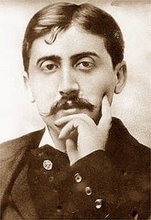
I have made it halfway through the Overture (Part One in my version, which was revised in 1992 by DJ Enright) and thought I'd share some thoughts. In an earlier post, Luisa referred to the "spiraling subordinate clause glory" of the Proustian sentence. This is an excellent description--Proust's sentences are glorious and after reading them for a period of time, I feel light-headed and dizzy. They circle back upon themselves, clauses that describe clauses that were referring to earlier clauses. The most remarkable aspect of this is at the end of a paragraph/sentence, I know exactly what he's talking about.
Speaking of long sentences, I would like to enter my current favorite in the longest sentence in literature contest:
"But I had seen first one and then another of the rooms in which I had slept during my life, and in the end I would revisit them all in the long course of my waking dream: rooms in winter, where on going to bed I would at once bury my head in a nest woven out of the most diverse materials--the corner of a my pillow, the top of my blankets, a piece of shawl, the edge of my bed and a copy of a children's paper--which I had contrived to cement together, bird-fashion, by dint of continuous pressure; rooms where, in freezing weather, I would enjoy the satisfaction of being shut in from the outer world (like the sea-swallow which builds at the end of a dark tunnel and is kept warm by the surrounding earth), and where, the fire keeping in all night, I would sleep wrapped up, as it were, in a great cloak of snug and smoky air, shot with the glow of the logs intermittently breaking out again in flame, a sort of alcove without walls, a cave of warmth dug out of the heart of the room itself, a zone of heat whose boundaries were constantly shifting and altering in temperature as gusts of air traversed them to strike freshly upon my face, from the corners of the room or from parts near the window or far from the fireplace which had therefore remained cold;--or rooms in summer, where I would delight to feel myself a part of the warm night, where the moonlight striking upon the half-opened shutters would throw down to the foot of my bed its enchanted ladder, where I would fall asleep, as it might be in the open air, like a titmouse which the breeze gently rocks at the tip of the sunbeam;--or sometimes the Louis XVI room, so cheerful that I never felt too miserable in it, even on my first night, and in which the slender columns that lightly supported its ceiling drew so gracefully apart to reveal and frame the site of the bed;--sometimes, again, the little room with the high ceiling, hollowed in the form of a pyramid out of the two separate storeys, and partly walled in mahogany, in which from the first moment, mentally poisoned by the familiar scent of vetiver, I was convinced of the hostility of the violet curtains and of the insolent indifference of a clock that chattered on at the top of its voice as though I was not there; in which a strange and pitiless rectangular cheval-glass, standing across one corner of the room, carved out for itself a site I had not looked to find tenanted in the soft plenitude of my normal field of vision; in which my mind, striving for hours on end to break away from its moorings, to stretch upwards so as to take the exact shape of the room and to reach to the topmost height of its gigantic funnel, had endured many a painful night as I lay stretched out in bed, my eyes staring upwards, my ears straining, my nostrils flaring, my heart beating; until habit had changed the colour of the curtains, silenced the clock, brought an expression of pity to the cruel, slanting face of the glass, disguised or even completely dispelled the scent of vetiver, and appreciably reduced the apparent loftiness of the ceiling."
And now I swoon...
I have found Swann's Way is best enjoyed early in the evening when I can snuggle in my favorite reading chair with a mug of Sleepytime Tea and devote myself to the task of reading. Monsieur Proust doesn't conform himself to my typical protocol for book-reading. He does not like to be half-attended to while the pasta is stirred or dropped in on for a few quick minutes while waiting for the bus. Instead, he demands my utmost concentration and respect. And if I give him these things, he rewards me handsomely with images of beauty seen through the crystal prism of Combray. So, a bit demanding, but worth it.

4 comments:
I'm so glad you are finding it worth it. As I remember, it only gets better....
My favorite time to read Mr. P is right before bed. All that talk of bedtime makes the perfect nightcap. And it's so moody and melancholic.
Finally made it past the introduction (which I consider a necessary but tedious chore) and am enjoying THE BOOK!
What version are you reading, Adriana? Is it the one with the introduction by Richard Howard? I'm with you, I hate reading the introductions, but feel it necessary for so monumental a read. That said, I thought Richard Howard did a pretty good job setting the stage for the book, though he took the introducing-Proust-to-the-readers joke a bit too far at times.
I'm reading the new Penguin Classics translation by Lydia Davis. Her's is a pretty stright-forward discussion of the various past translations and an overview of the entire work. Hmm, now I'm intrigued by the Howard introduction.
Post a Comment